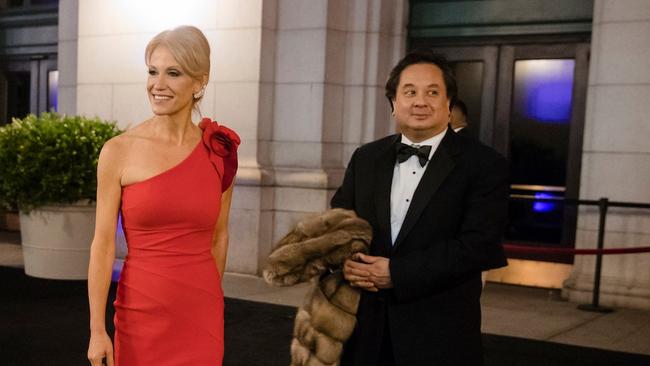Loathe your loved one’s politics? Here’s some advice
Ahead of an election that has fuelled partisan divides, here’s how to navigate relationships with people with opposing views.

Want to throttle someone you know over politics?
You’re not alone.
Two weeks from an election that has fuelled more bitter divisions than America has seen in decades, it feels harder than ever to interact with people who have vastly different views. And as much as we might want to avoid these folks, it’s not always possible — or desirable — especially if they are friends or family.
Many of us feel a responsibility to express our political opinions. But we want to coexist peacefully with our loved ones, as well, even if their politics drive us crazy. To get advice on how to keep our relationships healthy, I spoke with Jeanne Safer, a psychologist who has had a private psychotherapy practice in Manhattan for more than 45 years. For four decades, she’s been in a mixed political marriage — she is a Democrat and her husband is a Republican and a senior editor at the conservative magazine, “National Review.” Their marriage inspired her latest book: “I Love You, But I Hate Your Politics: How to Protect Your Intimate Relationships in a Poisonous Partisan World.”

Here are edited excerpts from our interview.
Is it harder for people with different views to get along these days?
Dr. Safer: I think so. We’re more polarised. The world has become a place where people do not talk across party lines.
But shouldn’t we try harder to get along when we’re already isolated because of the pandemic?
Yes, absolutely. The last thing you want is to be alienated or less connected. Remember: These people are going to be in your life long after the election.
Why does it bother us so much when someone we love disagrees politically?
Because the disagreement isn’t really about politics. It’s about psychology — about how we see the world differently. Once a person understands this, it changes the whole dynamic. Psychoanalysis makes the distinction between manifest and latent content. Manifest content is what you think you’re talking about. In this case, that is politics. Latent content is what you’re really talking about, which is feelings and what the disagreement, or the act of disagreeing itself, stirs up.
We have a fantasy that people who are our intimates are going to be like us in every fundamental way. We wonder: How can somebody important to me not see what I see? And yet there are always going to be significant points of contention in an intimate relationship.
Should we avoid discussing politics?
Yes, if you feel it will lead to an argument. You can have a discussion if you can both do it civilly, without raising your voices. But the key to having a decent political conversation with someone who has opposing beliefs is to listen more than you talk. Because you can only be responsible for how you conduct yourself. You can always say: “We just see this very differently.”
What you want to avoid is a political fight in a relationship of any kind. It’s just a lose-lose situation — not the disagreement but the fight. It’s important that if this is someone you care about and you know what a hot-button issue politics is, that you simply don’t talk about it. It’s essential to have a certain amount of self-control and know what to avoid in a relationship.
How do you avoid it?
If someone starts a political fight with you, take charge. Don’t just allow yourself to be buffeted. Say: “Let’s not do this. I love you, but this is not something we can talk about fruitfully. Let’s not spend our time fighting. Let’s enjoy ourselves.”
People will thank you for it. Because they’re horribly uncomfortable. Nobody wants to spend their time yelling and screaming.
Is it even possible to sway someone’s political opinion?
No, no and no. People do change their minds. But not because you tried to force them to. And they are going to be offended if you tell them: “Let me show you the light. Let me show you how you are wrong.” You have to accept the premise that you will not change their mind.
What if the other person insists on talking politics, even as you try to avoid it?
If someone insists on discussing it, say something very brief and avoid giving an opinion. Say: “There are a lot of different ways to look at this.” And then immediately change the subject.
You have to think about preserving the relationship rather than making a point.
What if you still privately feel irritated or disappointed in the person?
You are going to feel that from time to time. This is part of a relationship. The antidote to that is to focus on what you love about them and what you have in common. You can remind yourself why you care about this person and why this person is a part of your life. And you can do this in advance of getting together. That will set you up to feel well-disposed to them.
You’re in a politically mixed marriage. What lessons have you learned?
People have a feeling that avoiding things is somehow weakness or hypocrisy. I’ve learned that it’s wisdom and civility.
And there are many things that are more important than politics: how the person treats you; if someone rejoices for your success and grieves for your troubles and backs you up; if you enjoy your time together. These are the things that count.
The thing that really matters is what I call the Chemotherapy Test. When someone has cancer and they’re in the hospital getting chemotherapy, they don’t ask the political affiliation or views of someone who is standing by their side getting them through it.
How do you watch election night with someone who has different political views?
You don’t.
Is there an upside to having different views from others in your life?
Yes. It expands your mind. You can learn something from them. It can make you more tolerant and more aware that the world is not just your little bubble. If you limit yourself to people who agree with you, you’re going to miss out on a lot of important relationships with people who might be good to you, who will add to your life.
The Wall St Journal






